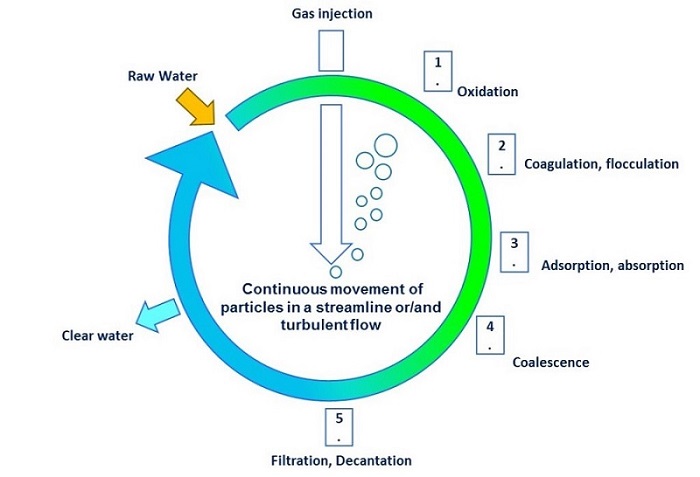Treatment of water and liquids with the Flocazur technology
The Uniqueness of Flocazur
Flocazur is a technique that consists of only one step – five different reactions in one reactor.The Flocazur technique could constitute a whole treatment installation or be part of a separation treatment system.The Flocazur technology uses and enhances the natural physical and chemical forces that bind particles. These forces are Brownian diffusion and Van der Waals attraction with strong adsorption/absorption and coagulation/flocculation capacity. These reactions together form a coalescence – the formation of homogenised sludge. The Flocazur reactor is designed to be fast and effective as to maximize coalescence in order to obtain homogenised sludge that is easy to separate. This makes it possible to use very small quantities of chemical polymers or avoide the use entirely. The Flocazur reactor also constitutes a very several effective transformation processes – nitrification, denitrification and separation of phosphor.
Flocazur Patented Technology in Sweden, USA, China, Australia, France, England and Germany.
Technical Advantages
Works on many liquids over wide ranges of densities and viscosities
Works over a wide range of temperatures
Optimizes pH and alkalinity management
Increases oxygen level and redox potential
Optimizes the reaction time for adsorption, absorption, coagulation and flocculation
Works with particles of different volumes and mass
Effectively reduces suspended solids, hydrocarbons, nitrogen and phosphor
Optimizes sludge thickening and coalescence
Optimizes the production of sludge, both in quality and quantity
Effectively reduces chemical oxygen demand (COD), biological oxygen demand (BOD) and total organic carbon (TOC)
Optimizes biological capacity for nitrification and denitrification
Efficient skimming of seawater
Reduces energy consumption
Reduces the use of chemicals
Is scalable and can be included in another clarification process or perform on its own
By means of
New innovative reactor design
New innovative blending technique
Optimization of chemical reactivity
Effective stripping of harmful gases
Effective dispersion of hydraulic energy in the reactor between processes
Optimization of oxidation by a more efficient diffusion technique of air or ozone
Optimization of the particle interaction rate in the reactor / coagulation
Optimization of flocculation by efficient energy transfer after coagulation
Optimization of growth and bacteriological reactivity with or without natural carriers
Perfectly suited for MBR, MBBR, GSBR and GSBBR bed systems
Longer Hydraulic Retention Time (HRT) in the reactor
Simultaneous management of flotation and settling

